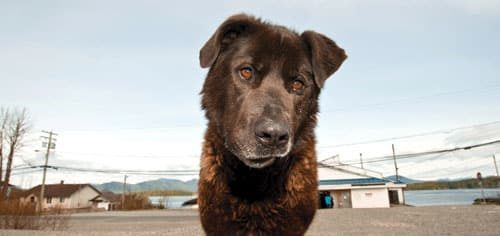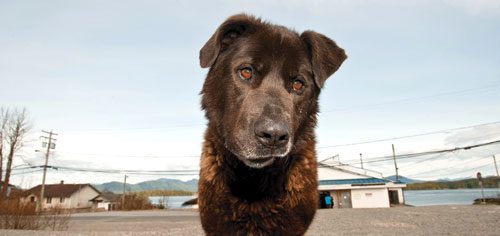

Big Hearts in Bella Bella
Two animal aid agencies combine forces to help dogs in a remote Canadian town
It’s funny that one telephone call can lead to a shift in perception, but that’s what recently happened to me when I received a call from Toronto’s Michelle Cliffe of the World Society for Protection of Animals (WSPA). We set up a meeting and, over a cup of coffee, Cliffe told me about the invaluable animal welfare work that WSPA instigates worldwide, and of her particular enthusiasm for a project they were about to undertake: assisting Big Heart Rescue with an animal wellness clinic in the northerly First Nations community of Bella Bella. She suggested I join them. On impulse, I found myself on a plane the next day along with Cliffe and Josey Kitson, also from WSPA, as well as photographer Jeremiah Armstrong, bound for the picturesque and remote community of Bella Bella.
It was enlightening. I had read newspaper stories of packs of dogs roaming wild in native communities, largely uncared-for and diseased; stories of overpopulation problems caused by unneutered dogs roaming freely and of culling by way of shotgun to keep the animal population in check. Instead, what I found in Bella Bella were happy, largely healthy, well-adjusted dogs, loved by their families and the community as a whole. Granted, I didn’t see any dogs carried around in designer bags or wearing expensive collars; rather, I was reminded of how dogs were commonly treated when I was a child—provided with a dog house in unfenced yards, and allowed to freely roam the neighbourhood. Strolling the streets in Bella Bella, I’d see dogs flopped down in a sunny spot on the side of the road having a little snooze, or stopping by the local café in hopes of a hand out, or merely meandering down the road to say “hi” to their doggie pals. As these dogs spend most of their time outside, most have incredibly thick coats, providing them with the insulation needed, especially in winter, to ward off chill. Everyone I spoke to seemed to know the names of all the dogs and to whom they belonged.
Different cultures have differing views on animals, the roles they play in their respective societies, and the treatment they receive. One thing, however, should remain constant: the provision of adequate food, water, shelter, and health care. This makes for happy animals, and as Cliffe says, “Happy animals make for happy people.” WSPA and organizations such as Big Heart Rescue focus on providing vet services to communities like Bella Bella, because in such a remote area, a visit to the veterinarian can mean flying an animal out by plane. WSPA and Big Heart organize clinics, bringing veterinary services to the community to help keep dogs and cats healthy.
At the Bella Bella airport to greet us was Gail Moerkerken, founder and coordinator of Big Heart Rescue, along with her team of volunteers. If you’re lucky enough be on the receiving end of a hug from Moerkerken, you’ll understand why her rescue group is called Big Heart; she is a bottomless well of love for animals and has a seemingly limitless capacity to help others. On the drive to Bella Bella’s school, where a makeshift clinic was being set up in the science lab, I got to hear her story and why she started Big Heart Rescue.
Ironically, it began in this same community nearly 13 years ago, when a friend found a dog in desperate need of medical attention. The dog was suffering from distemper, the deadly and highly infectious disease that, if left untreated, usually leads to the death of the animal. The friend couldn’t bear to just leave the dog to die, so she called Moerkerken asking what she should do. Unsure herself, Moerkerken couldn’t find anyone to call to action and, knowing the dog was slipping away, opted to take matters into her own hands.
Enlisting the assistance of Pacific Coastal Airlines, the dog was flown to Vancouver and was soon receiving veterinary care. Sadly, though everything medically possible was done for Spirit (as they chose to call the dog), the illness took its toll and Spirit passed on. But Spirit did not die in vain. She became the catalyst for the inception of Big Heart Rescue, a charity committed to providing service and resources for dogs like Spirit and the communities they live in.
Fast forward 13 years, and distemper has been eradicated from Bella Bella. As well, the community has been provided with regularly flown-in vet services, including vaccinations, de-worming, flea treatment, and, importantly, spay/neuter clinics—a commendable achievement indeed, especially when considering the enormous effort—and cost—such an undertaking requires.
It’s not until you actually see a mobile clinic in action that you realize what an expensive endeavour it is. It’s like a MASH hospital. There are vets, vet techs, and rescue workers who all play a vital role in organizing and running the clinic. Supplies, medicine, and transport are all required. The bulk of the cost is raised through charitable events, fund-raising drives, and grants, plus there is the essential support of sponsors such as Pacific Coastal Air, which flies the medical supplies and clinic team to their destination. In the case of this recent clinic, WSPA stepped in to cover the costs associated with the clinic and to help raise public awareness of the need for such initiatives in remote communities.
Over the next day and half, more than 62 dogs and cats were provided with vaccinations, medical check-ups, de-worming, flea treatment, basic wound care and, for some, a shave and a haircut.
It was a fascinating two days and a wonderful reminder that there are many, many, amazing organizations run by inspired—and inspiring—individuals and that there are myriad ways to contribute to the greater good, both in your own community and afar.
Click here to check out some candid photos of the trip
Join the newsletter and never miss out on dog content again!
"*" indicates required fields
By clicking the arrow, you agree to our web Terms of Use and Privacy & Cookie Policy. Easy unsubscribe links are provided in every email.